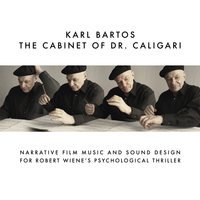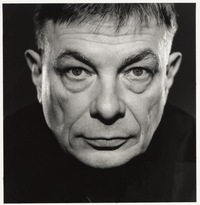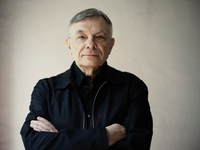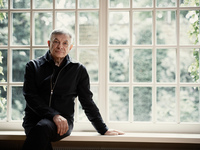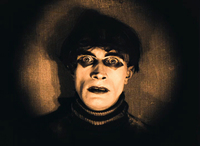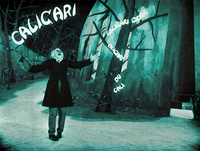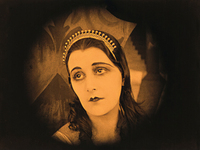KARL BARTOS
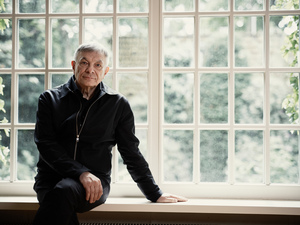
THE CABINET OF DR. CALIGARI
Narrative film music and sound design for Robert Wiene's classic 1920 psychological thriller.
2012 - 2014 digitally restored in 4K by the Friedrich-Wilhelm-Murnau-Foundation.
Musician and writer Karl Bartos has long been admirer of Weimar-era culture. During his time in Kraftwerk, he helped create the stunning track 'Metropolis', directly inspired by a band viewing of the classic 1927 Fritz Lang film of the same name. The original orchestral music composed for The Cabinet of Dr. Caligari by Giuseppe Becce had long been lost and in 2005, after watching the film, Bartos imagined what it would be like to create an entirely new one in the 21st Century in his home studios in Hamburg. Now with crystal clear images, digitally restored by the Friedrich-Wilhelm-Murnau-Foundation, the film is visually the best quality it has ever been, and now, with Bartos' soundtrack, there is impressive sound to go with the haunting vision.
For the task, Bartos ransacked his own library of musical compositions, recreating pieces he had written as a young classical musician in his pre-Kraftwerk days whilst creating new sounds, melodies and textures. The intention was not simply to write a film score per se. This was to be an immersive listening experience with special sound effects to match the action as we enter the film as both spectator and participant. A creaking door, footsteps on gravel, the turning of pages in a ledger, a half-heard fragment of dialogue are seamlessly synchronised to the action on screen. By taking the characteristics of Expressionism in the arts, and transferring them into film making, a disturbing, distorted depiction of reality enwrapped and entrapped the viewer. The subjective replaces the objective. We are sucked into a parallel world lit in menacing chiaroscuro, where dimension, proportion and perspective are all off skew.
From the convex polygon-shaped windows of precipitously sharp-inclined buildings to the surreally odd tables and chairs with long spindly legs to be found in preposterously small and oddly shaped rooms, alienating camera angles and im possible vanishing points, the town of Holstenwall in which much of the action takes place, is the world of the imagination, not the empirical world of our own eyes and ears. 'The cinema image must become an engraving,' the film's set designer Hermann Warm said.
Into this world journeys Caligari himself played with supreme artifice by Werner Krauss. He is the hypnotist, a shamanistic figure who controls Cesare (Conrad Veidt), his exhibit, who resides as if dead in a coffin-like wooden cabinet, a somnambulist who can predict the future, and who only wakes at Caligari's bidding. Caligari, in top hat, hornrimmed glasses and white hair is, by turns oddly ridiculous with his facial mannerisms and gurning and dangerously demonic in his magical control. Cesare by contrast is strangely beautiful if tortured, his dark tousled short hair matted in sweat, his clownlike face a rictus of fear and possession. With dark kohl round the eyes and lipstick on the lips, he looks more modern, alarmingly so, yet the contortions and terror in his eyes seem only too real. The Cabinet of Dr. Caligari is rightly considered a classic and is a film which is endlessly debatable given its themes of power, control and possession, themes which took on an even deeper resonance in the 1930's and 40's as the world witnessed Hitler's Germany and Stalin's Russia. Had both countries sleepwalked into fascism and totalitarianism?
The startling image of Cesare has had a huge influence on popular culture: David Bowie constructed his Diamond Dog's tour set in 1974 as part homage to the film and the singer's last ever video, for the song 'Lazarus' in 2015, shows him playing his own version of Caligari's creepy somnambulist. Robert Smith of The Cure's gothic stage persona, performance artist Klaus Nomi, Johnny Depp's Edward Scissorhands and Joaquin Phoenix's Joker all carry direct echoes of Conrad Veidt's original extraordinary imagery and performance.
We can hear melodies that lie within the tradition of the Baroque Age of Bach, the early Romanticism of Mozart, the dissonance of Schoenberg, the unsettling metric play of Stravinsky and the harshly dramatic repetitions of Philip Glass. From outside of the classical tradition there is the folklorist bricolage of the fairground barrel organ tempered playfully by some psychedelic backwards musique concrete along with some melodies which would not have been out of place on a Kraftwerk album from the classic era.
All the time the listener is on a journey, sounds move in and out, music weaves and entwines, the soundscape is immersive and intoxicatingly rich. It is music which is, by turns, beautiful, amusing, playful and profoundly disquieting and it is perfect fit for the aesthetic of era-jumping in the actual film. Dr. Caligari's action switches from the then present day to the past century and even further back before rebooting back to the imagined present.
'There's something about this film. No matter how often you watch it, it keeps its secrets. Who is mad and who is not always remains a question of interpretation,' says Bartos. The film remains an enigma, but now one with the soundtrack and soundscape it deserves.
David Buckley
Read the info sheet (PDF) in German
Read the info sheet (PDF) in English
Download press kit here
SHORT BIOGRAPHY: KARL BARTOS
Born in the beautiful German village of Berchtesgaden in 1952, sound, music and culture have been a lifelong fascination for Karl. He studied at the Robert Schumann Conservatory in Düsseldorf, played at the Deutsche Oper am Rhein and was in several experimental bands before he joined Kraftwerk for their Autobahn tour of the United States in 1975. He co-composed tracks and performed with the band until 1990 and is featured on the seminal albums Radio-Activity (1975), Trans-Europe Express (1977), The Man-Machine (1978), Computer World (1981), Electric Café (1986) and The Mix (1991). After leaving Kraftwerk, he first formed the band Elektric Music releasing two albums, Esperanto (1993) and Electric Music (1998), collaborated with Bernard Sumner (New Order), Johnny Marr (The Smiths) for their Electronic band project and with Andy McCluskey (OMD), and released two well-regarded solo albums Communication 2003 and Off the Record 2013. Showing his versatility as a thinker and communicator, Bartos was also guest professor in Auditory Media Design at the University of the Arts Berlin from 2004 to 2009. In 2021, Karl Bartos was awarded the Early Influence Award / Kraftwerk as a member of the 'classic line-up' and inducted into the Rock and Roll Hall of Fame. His autobiography "The Sound of the Machine – My Life in Kraftwerk and Beyond" was published in the UK and USA 2022 by Omnibus Press, and in paperback in November 2023. The Cabinet of Dr. Caligari is his first piece of film music and sound design.
